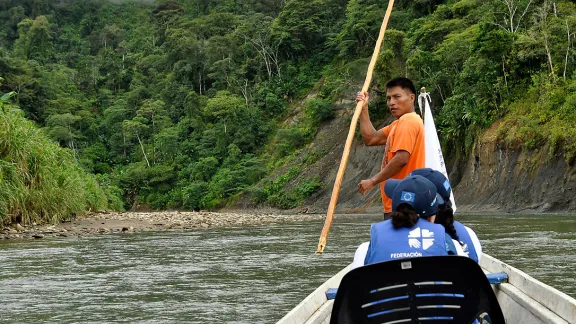
The Chicué River, in northwestern Colombiaâs Chocó district, along which the LWF provides humanitarian assistance. Photo: Church of Sweden/Therése Naomi Jonsson
“LWF has taught us to farm more nutritious crops"
Along the Chicué River, in northwestern Colombia’s Chocó district, The Lutheran World Federation (LWF) provides humanitarian support to indigenous communities.
Like other communities in the project, the village of Nueva Jerusalén has appointed two local promoters, one male and one female. The local promoters function as focal points for the villagers and support the project’s implementation. One part of the project aims to support more efficient farming techniques, and protection against harmful effects from natural hazards and other risks.
“We have learnt to farm more efficiently and to handle risks. For example, we now start to cultivate only with a safe distance of ten meters from the rivers. Before, we use to cultivate right by the river bank, but when the river grows it sweeps the planted seeds with it,” says Jota Cabrera Dumaza Dinamiza, one of the local promoters.
Another aspect in the LWF work on risk reduction involves building houses higher up on poles, so that water can’t reach them during flooding, and planting trees with strong roots along the river bank. This increases resilience to strong wind and rains, and prevents land erosion.
Iloriza Cabrera Tunas is one of the project’s beneficiaries. During the decades of armed conflict it was occasionally unsafe to access the farm fields. Natural hazards and flooding have further exacerbated the situation and contributed to food shortages and malnutrition.
“We didn’t have enough food, we couldn’t hunt and it affected us a lot – also psychologically,” says Tunas.
Tunas lives with her 7-year-old son in Nueva Jerusalén. She usually starts her day by checking her home garden, and clearing it of weeds and vermin. Then she cleans the house, cooks and does the laundry before she walks down to the farm field, where they cultivate yucca, bananas, corn, sugar cane, rice and pineapple, among other things.
“LWF has also taught us to farm more nutritious crops,” says Tunas.
When armed groups were active in the area, reports of rape and forced recruitments emerged. Sometimes helicopters would come and drop bombs. Since the Colombia peace negotiations began, things have calmed down, she says.
“We didn’t feel free and we were constantly afraid. It is better now that we know the government and FARC have signed the peace agreement, but it’s still uncertain what will happen with the paramilitary groups,” says Tunas.
LWF supports local coping mechanisms. For example, now groups have been formed to accompany women to the farm fields, in order to reduce their vulnerability to attack. LWF also trains local indigenous guards, who can warn other villagers if a storm or another source of danger approaches, and how to best protect them.

Iloreza has a three-month-old home garden where she is growing coriander, oregano and basil. The LWF project is important for her and her 7-year-old son.

Residents of Nueva Jerusalén at a community center. To the left is Jota Cabrera Dumaza Dinamiza, one of the local promoters within the project.

A home garden with chilis in the village of Nueva Jerusalén. The gardens are important for improving food security in the region.
The project is financed by ECHO, the European Commission’s Humanitarian Aid and Civil Protection department.

Article by Therése Naomi Jonsson, Church of Sweden, which supported LWF with this project.


